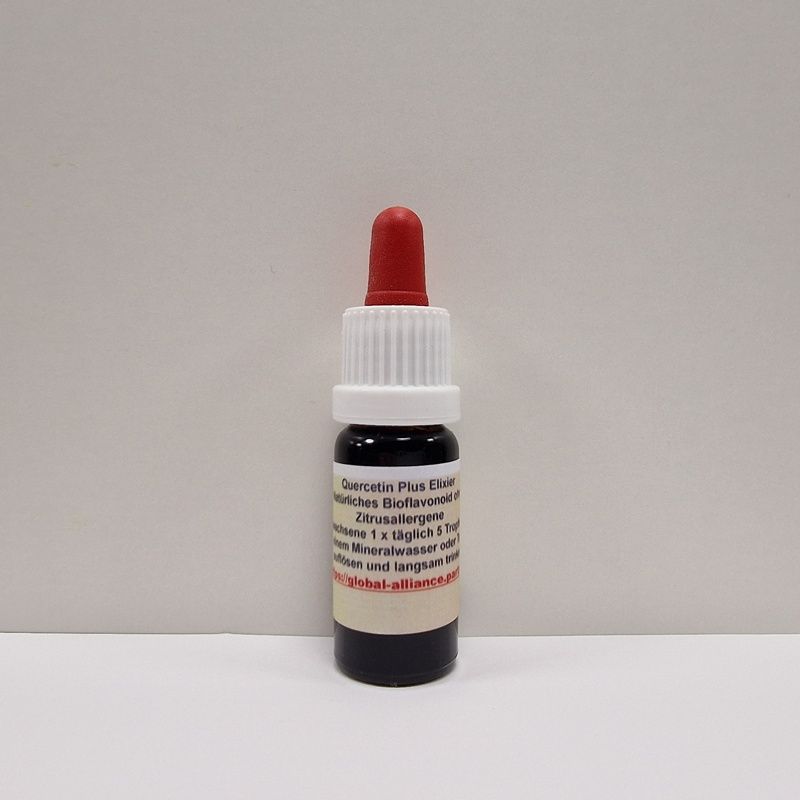Kvercetin Plus Eliksir
5.0
1 recenzija
Recenzije potvrđenih korisnika koji su kupili proizvode u ovoj trgovini.
4,93 €
Haltbar mindestens 24 Monate
Menge
Na skladištu
Detalji o proizvodu
Kvercetin Plus Eliksir
Prirodni bioflavonoid bez citrusnih alergena
Pojava: Kvercetin je široko rasprostranjen u biljnom carstvu, a nalazi se i u namirnicama poput luka, kapara (posebno u visokim količinama), ljupčaca (posebno u visokim količinama), kelja, borovnica, vlasca, brokule, zelenog graha i jabuka.
Bioflavonoid kvercetin uvijek pruža nova iznenađenja! Na primjer, Ärztezeitung (Medical Journal) izvijestio je da kvercetin može poboljšati tjelesnu kondiciju - bez ikakve tjelovježbe. Američki istraživački tim u Kolumbiji pronašao je dokaze da kvercetin može poboljšati biogenezu mitohondrija, koji se smatraju biokemijskim "elektranama" stanica. Otkriveno je da se nakon uzimanja kvercetina povećava izdržljivost, bez ikakve dodatne tjelesne aktivnosti.
Kvercetin je poznat i po svojim svojstvima zaštite stanica i po svojim blagodatima za kardiovaskularni sustav. Pomaže u održavanju histaminskog odgovora tijela prirodno podržavajući nosne prolaze. Kvercetin može inhibirati metaloenzim koji katalizira stvaranje mokraćne kiseline. Ovaj bioflavonoid inhibira oksidaciju LDL kolesterola. Korišten samostalno ili u kombinaciji s vitaminom C, kvercetin tako može zaštititi živce i krvne žile.
Kvercetin pripada skupini bioflavonoida, ali ne sadrži citrusne alergene. Polifenol se u većim koncentracijama nalazi, na primjer, u luku, jabukama i brokuli. Njegovi izuzetno raznoliki učinci prvenstveno se temelje na njegovim izvanrednim antioksidativnim svojstvima.
S vitaminom C koji je koristan za želudac!
Sinergijski učinak, jer se kvercetin i vitamin C međusobno štite i regeneriraju.
Umirujuća svojstva za tkiva
Nježan za želudac, jer je vitamin C prisutan kao kalcijev askorbat
Sastojci: Kalcijev askorbat, kvercetin dihidrat, vitamin C, magnezijeve soli
Preporučena upotreba:
Odrasli otopiti 5 kapi u mineralnoj vodi ili čaju jednom dnevno i polako piti.
Spremi ovaj proizvod za kasnije
Recenzije korisnika
Samo recenzije potvrđenih korisnika
Prihvaćaju se samo recenzije potvrđenih korisnika koji su se registrirali i kupili proizvode. Ovo će osigurati da je svaka recenzija utemeljena na stvarnom korisničkom iskustvu. Sve se recenzije provjeravaju prije objave, kako bi se spriječio spam.
Jens C.
Nienburg,
Deutschland
06 Listopad 2025
Bis Quercetin seine entzündungshemmende Wirkung zeigt können laut Studien Wochen bis Monate vergehen. Ich nehme es seit ca. 10 Tagen und vertrage es hervorragend. Leider steht auf der Flasche nicht wieviel mg je Tropfen enthalten sind. Das sollte noch nachgebessert werden. Sonst alles Top.
Kvercetin Plus Eliksir
Prikaži cijene u:EUR
